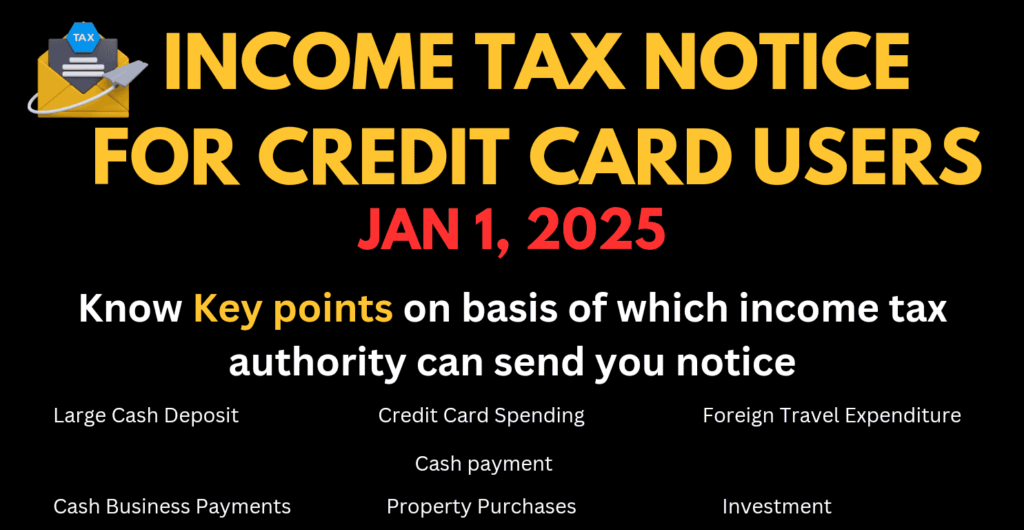Income Tax Notice for Credit Card Users

Quick Overview
Credit card users must be cautious about certain financial transactions to avoid receiving notices from the Income Tax Department. Engaging in specific high-value transactions can trigger scrutiny and potential penalties, making it essential for individuals to be informed about what activities could lead to such consequences.
Key points on basis of which income tax authority can send you notice
- Foreign Travel Expenditure: Spending over ₹2 lakh on foreign travel in a year is monitored.
- Credit Card Spending: Annual credit card expenditures exceeding ₹2 lakh are flagged by the Income Tax Department.
- Cash Payments: Paying credit card bills in cash over ₹1 lakh is a red flag.
- Investments: Investments in mutual funds, shares, or bonds exceeding ₹10 lakh in a year can attract attention.
- Property Purchases: Buying property valued at ₹30 lakh or more is reported to tax authorities.
- Large Cash Deposits: Depositing more than ₹10 lakh in cash in a bank account raises suspicion.
- Cash Business Transactions: Cash transactions in business exceeding ₹50,000 are closely monitored.
Detailed Breakdown
1. Foreign Travel Expenditure
The Income Tax Department is alerted if an individual spends more than ₹2 lakh on foreign travel within a financial year. This expenditure is tracked to ensure compliance with tax regulations.
2. Credit Card Spending
Credit card users should be aware that spending over ₹2 lakh annually on their cards can lead to increased scrutiny from tax authorities. Such large transactions may suggest unreported income or financial irregularities.
3. Cash Payments
Making cash payments for credit card bills that exceed ₹1 lakh is another transaction that can attract the attention of the Income Tax Department. This practice is discouraged as it can be perceived as an attempt to conceal income.
4. Investments
Investing more than ₹10 lakh in mutual funds, shares, or bonds within a single financial year can lead to an income tax notice. The department monitors significant investment activities to ensure that they align with reported income.
5. Property Purchases
Acquiring property valued at ₹30 lakh or more automatically triggers a report to the Income Tax Department. This measure is in place to track high-value assets and ensure proper tax compliance.
6. Large Cash Deposits
Depositing cash amounts exceeding ₹10 lakh into a bank account can raise suspicions and potentially lead to an income tax notice. The department views large cash deposits as indicative of unaccounted income.
7. Cash Business Transactions
Business transactions conducted in cash that exceed ₹50,000 are also monitored by the Income Tax Department. Such transactions can lead to inquiries about the source of funds and overall financial practices.
Important Details & Evidence of Income Tax Authorities 2025
The Income Tax Department employs various measures to monitor high-value transactions to prevent tax evasion. The data collected from these transactions can lead to audits or notices, which may require individuals to justify their financial activities. Tax professionals, such as Chartered Accountants, may not be able to provide relief in cases where the transactions are clearly in violation of tax regulations.
What should we do to not to be noticed by Income tax authorities?
To avoid receiving an income tax notice, credit card users should refrain from engaging in the highlighted transactions. Awareness of the thresholds for foreign travel, credit card spending, cash deposits, investments, and property purchases is crucial. By adhering to these guidelines, individuals can safeguard themselves from potential scrutiny and ensure compliance with tax laws. It is advisable to maintain transparent financial practices and consult with tax professionals when in doubt about specific transactions.